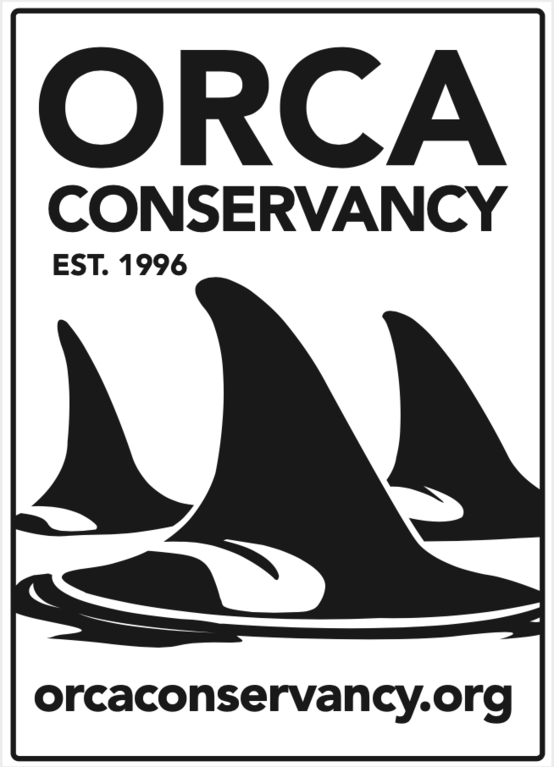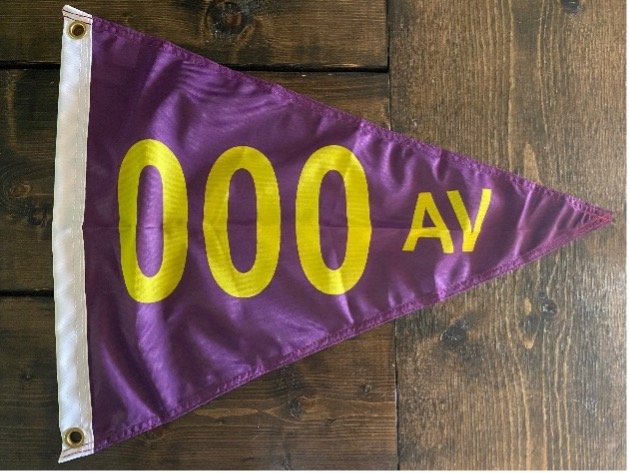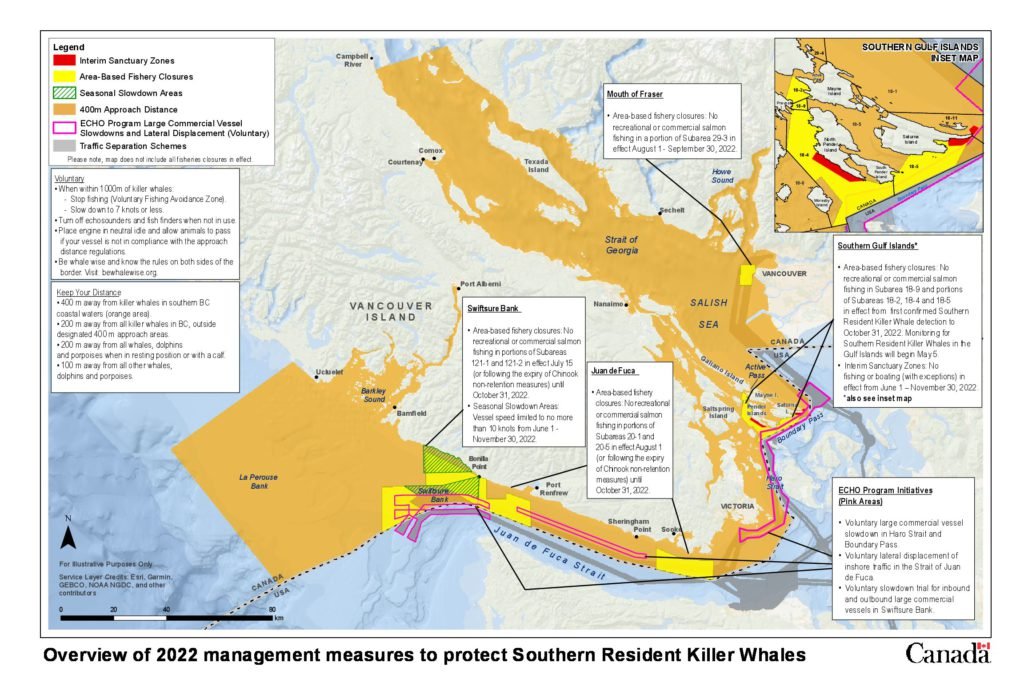
Resources
Be Whale Wise Guidelines
Washington State Law:
Boats are required to stay 300 yards from either side of Southern Resident killer whales.
Boats are required to stay 400 yards out of the path (in front/behind) of the Southern Resident killer whales.
Boats must go slow, <7 knots within 1/2 mile of Southern Resident killer whales.
If whales appear within 300 yards engines must be disengaged
Boats should stay 100 yards from all other marine mammals, including humpback whales, gray whales, sea lions, and seals
See the full Washington State RCW 77.15.740
Canada Law:
Boats are required to stay 400 metres from all types of killer whales in all of southern BC coastal waters.
Vessels flying a purple Authorized Vessel “AV” Flag are authorized to approach up to 200 metres of non-Southern Resident killer whales.
Boats are required to remain 200 metres away from killer whales in other Canadian Pacific waters, and from all other cetaceans (whales, dolphins, porpoises) if they are resting or are with a calf.
Boats are required to stay 100 metres away from all other whales, dolphins and porpoises in Canadian Pacific waters.
Drones are disruptive to marine mammals and are discouraged from viewing marine mammals without an appropriate permit.
Vessels must slow down to 10 knots or less in Seasonal Slowdown Areas.
Flags
Whale Warning Flag
Indicates:
Whales are in the vicinity
Vessels should slow down to 7 knots or less and be prepared to change course
Turn off fishfinders and depth sounders
Observe direction of travel of marine life and other vessels to determine proper way to navigate area.
AV Flag
Indicates:
A commercial whale watch operator that is licensed to approach non-Southern Residents up to 200 metres
Has trained naturalists who have agreed to undertake additional conservation practices to reduce impacts to Southern Resident killer whales.
This is an authorized vessel, do not follow.
Know the Zones
San Juan Island West Side Voluntary No-Boat Zone
This is a voluntary No-Go Zone that encompasses sensitive foraging and resting areas for the Southern Resident killer whales. This zone is in place year-round. In order to give whales space and to responsibly navigate the west side of San Juan Island, it is encouraged to keep out of the No-Go Zone.
The zone extends:
1/4 mile offshore from Mitchell Point to Cattle Point
1/2 mile around Lime Kiln State Park
Canada Interim Sanctuary Zones
Saturna Island
Pender Island
Canadian Seasonal Slowdown Areas
Swiftsure Bank
To learn more about Be Whale Wise Guidelines and for more additional resources please visit the Be Whale Wise website.
Report a Boater Violation
All marine mammals are protected under the Marine Mammal Protection Act (MMPA) of 1972. The MMPA “prohibits the “take” of marine mammals - including harassment, hunting, capturing, collecting, or killing, in US waters and by US citizens on the high seas.” Additionally, Southern Resident killer whales are listed as endangered and are protected under the Endangered Species Act (ESA) of 1973.
Violations of boater regulations and Be Whale Wise guidelines are a form of marine mammal harassment and should be reported accordingly.
How to Report a Violation
Call or submit an online report with the following agencies:
NOAA Fisheries
(800) 853-1964
Washington State Department of Fish and Wildlife (WDFW)
Report a violation online form
Email: enforcement-web@dfw.wa.gov
*Note the online submission form does not allow for attachments. To send attachments please send via email in addition to submitting the report in the online form.
Be Whale Wise
*Note this form sends violation report to multiple agencies including, NOAA, WDFW, Soundwatch, and more.
Tips for Reporting Violations
Collect all neccessary information including
Vessel license number or VIN
Vessel make, color, model, year, and condition
Type of violation, including when and where it occurred (time, GPS coordinates, direction of travel), and species involved
Clear description of incident
Description of person(s) that committed the violation
Photos or videos of the incident. Videos are preferred when reporting on distance violations. Videos can clearly depict behaviors and if vessel motor is running.
Marine Mammal Strandings
What is a Stranding?
A marine mammal that is on shore and unable to return to the water on its own.
A marine mammal that is on shore, and while capable of returning to the water, is in need of medical attention.
A marine mammal in the water that is unable to return to its natural habitat (examples: beached, trapped, entangled).
A dead marine mammal on the beach or in the water.
How to Report a Stranding
First and foremost determine if the animal is stranded or distressed. Many seals and sea lions haul out and thermoregulate on land and are not in distress. Mother seals also often leave young seal pups on the beach while they hunt. Monitor the animal’s behavior and condition for 24 hours when possible. Keep other people and pets 100 yards a way to minimize disturbance. Be aware of additional hazards such as rising tides, and monitor from a safe area.
West Coast Region Stranding Hotline:
Entanglement Reporting Hotline:
Reporting Hotlines
Washington and Puget Sound Hotlines
Whatcom County Marine Mammal Stranding Network:
(360) 966-8845
San Juan County Marine Mammal Stranding Network:
(800) 562-8832
Central Puget Sound Marine Mammal Stranding Network:
(866) ORCANET
Sno-King Marine Mammal Response:
(206) 695-2277
Seal Sitters Marine Mammal Stranding Network: (206) 905-7325
MaST Center Stranding Team:
(206) 724-2687
Vashon Hydrophone Project:
(206) 463-9041
Washington Department of Fisheries and Wildlife:
(253) 589-7235
Cascadia Research Collective:
(360) 791-9555
Port Townsend Marine Science Center:
(360) 385-5582 x 103
Dungeness National Wildlife Refuge:
(360) 457-8451
Feiro Marine Life Center:
(360) 417-6254
Makah Tribe:
(360) 640-0569
Olympic National Park:
(360) 565-3115
NOAA Olympic Coast National Marine Sanctuary:
(360) 457-6622
Portland State University/Seaside Aquarium: (503) 738-6211
For additional hotlines outside of Washington, visit the Regional Strandings Response Contacts page to find a reporting hotline near you.
Report a Spill
Oil and hazardous spills, along with derelict gear can cause detrimental environmental damage. The sooner any spill or hazard is reported, the quicker it can be addressed to limit damage.
Orca Conservancy is a registered organization for oil spill response with the Department of Ecology and the Washington Department of Fish and Wildlife. Select Orca Conservancy members and volunteers are Hazardous Waste Operations and Emergency Response (HAZWOPER) trained and are prepared to aid in a spill response.
How to Report a Spill
Washington Emergency Management Division 24/7 Hotline:
1-800-OILS-911 or 1-800-645-7911
United States Coast Gaurd Nation Response Center:
1-800-424-8802
Note: in the event of spills, unique hotlines and information will be available to report wildlife sightings and oiled wildlife. Unified Comand Center will open these hotlines during a response, and these numbers will be made readily available.
How to Report Derelict Gear
Derelict Gear Hotline:
1-855-542-3935
Reporting Different Types of Spills
| Type of Spill | Reporting Requirements | Contact |
|---|---|---|
| Oil and hazardous substances in water | Report immedately | • The National Response Center at 1-800-424-8802 • Washington Emergency Management Division at 1-800-258-5990 |
| Release of hazardous substance | Report immediately | •The State Emergency Response Commission (SERC) at 1-800-258-5990 •Your Local Emergency Planning Committee (LEPC) •The National Response Center at 1-800-424-8802 |
| Dangerous waste | Report immediately | •Call 911
•Notify your Ecology regional office |
| Leaking underground storage tanks | Report within 24 hours | •Notify your Ecology regional office |
| Oil spills to grounds | Report within 90 days | •Notify your Ecology regional office |
| Spills to air | Report within 90 days | •Notify your Ecology regional office |










